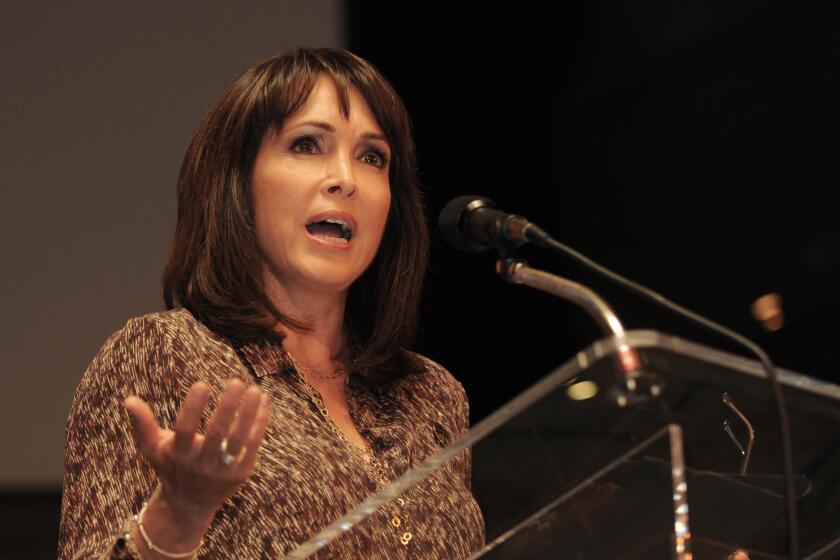In Late Night, the Contrasts Grow Stark
- Share via
Jay Leno leaves for an undisclosed location today to entertain U.S. military troops. And yet, according to the media, it is David Letterman who is providing a service to Americans, making the world “a better place for having Dave in it,” as TV critic Ken Tucker gushed recently in an Entertainment Weekly cover story on the “Late Show” host.
Then again, that’s hardly a minority opinion. Rolling Stone, in its year-end issue, names Letterman one of the “people who got us through.” And Time magazine singles out Letterman’s post-Sept. 11 return as its top TV moment of the year.
The Time blurb sounds curiously like a trailer for a movie about an action hero: “Irony was dead, they said. Humor was unseemly. And late-night comics, those unacknowledged legislators of America, no longer had anything to say to us. Yet it took a late-night comic to voice, movingly and indelibly, how we felt.”
As for Leno? He and “The Tonight Show” remain the high school equivalent of the dorky valedictorian--eager to please and hard-working, but no one the drama kids would invite to a party.
In fact, a casual observer of late-night television could easily presume Letterman was the reigning king of late night, even though his show still trails Leno’s by nearly 2 million viewers overall. The trend has been so steady during the last several years that a modest surge by Letterman--narrowing the gap, especially among younger viewers, during the November rating sweeps--fueled the perception that Letterman’s post-Sept. 11 shows were resonating anew.
Leno is accustomed, of course, to operating in Letterman’s shadow. In the meantime, he’ll do what he’s always done--put in face time with Americans, whether at an Indian casino in the Smoky Mountains (last weekend) or on a military base overseas (this weekend).
“You can do it on TV, or you can go door to door,” Leno said, asked if he feels slighted by Letterman’s press. “That may not be as effective, but in the long run I think it’s more satisfying.” Letterman, who has shunned interviews in recent years, again declined a request.
“Clearly, Dave is the more culturally relevant of the two,” said Rob Burnett, “The Late Show” executive producer. “How can that be if one guy has the higher rating? Well, ratings and cultural relevance have never gone together.” (“Tonight Show” executive producers Debbie Vickers and Gary Considine declined to be interviewed.)
And so it goes: Letterman is loved by the media, by the boomer TV sophisticates, but more people watch Leno. Put another way, Letterman is the PBS documentary that interests you, but Leno is the old episode of “Three’s Company” you end up watching. In a recent informal survey conducted by IKEA, for instance, people said they were three times more likely to fall asleep watching Leno than Letterman.
In a sense, the dichotomy between Leno and Letterman (much-chronicled since Johnny Carson retired in 1992 and Leno got “The Tonight Show,” eventually sending Letterman to CBS) has never been more pronounced, as Letterman earns kudos for adapting his program to post-Sept. 11 realities and Leno keeps dancing with the show that got him here, Osama bin Laden having replaced O.J. Simpson or President Clinton on the comic’s roasting dais.
That comedic approach--in which everyone is targeted for the same incessant ribbing, even a wanted terrorist--has Leno doing bits like “Where Has Osama bin Hidin’?” (This week, “The Tonight Show” had Bin Laden in a dress, singing “I Feel Pretty” in a dinner theater production of “West Side Story.”)
This is a typical Leno joke--something that flirts with being edgy but makes clear that no one’s going to get offended, his show as populist as the circus.
But have the times made Leno seem suddenly out of touch? Certainly the critics think so, as Letterman has been widely credited with adjusting his show to fit the new collective mood--or at least the new collective mood as perceived by the New York and Los Angeles media.
It’s a process that began Sept. 17, when Letterman kicked off his first post-Sept. 11 show with a cold opening. “If we are going to continue doing shows here in New York, then I need to hear myself talk for a few minutes,” he said, his gaunt looks finally fitting the occasion. When CBS News anchor Dan Rather later broke down, and Letterman took his hand, a classic moment was born, the critics agreed.
“I think it reminded people how good he is,” Burnett said. “So that brings a certain energy to the show, a certain focus, and as a result perceptions alter and change.”
Since that broadcast, Letterman has been peppering his comedy with what his loyal fans deem the emotionality of a guy who understands that the world outside his studio has forever changed.
Of course, Letterman being in New York, the world outside his studio has changed, while Leno, being in Burbank, experiences the same psychic disconnect of his fellow Angelenos. Unlike Letterman, then, Leno lacks the credibility of someone performing from the epicenter of the nation’s trauma.
Celebrities appearing on “Late Show” have made note of this. “For those of us on the other side of the world when all of this went on, you really made a huge difference for us,” George Clooney told Letterman during a recent “Late Show” appearance to plug his film “Ocean’s Eleven.”
That’s not to say Letterman isn’t doing Bin Laden jokes. On Tuesday, there was a Top 10 list of “Osama bin Laden Complaints” (No. 7: “You try to remember four wedding anniversaries”) and a mock promotional video urging tourists back to Kabul.
This may be more clever than Bin Laden in a dress, but you can still flip between the shows and be overcome by a drowsy sense that “The Late Show” and “The Tonight Show,” finally, are offering viewers the same basic service.
Nevertheless, the critics have been trumpeting the new Dave, the refreshing Dave, the compelling Dave. The Dave that Rolling Stone placed atop a list of the late-night shows that salved the nation’s wounds and encouraged us to laugh again in the aftermath of Sept. 11.
The only prominent late-night personality not on the page, in addition to CBS’ L.A.-based Craig Kilborn, is the guy who still leads the late-night ratings wars: Jay Leno.
And yet, the recently concluded November sweeps can be spun as a sign that “Late Show,” thanks to the newly relevant Dave, has virtually erased its deficit among the younger viewers networks covet.
In November, Letterman was up by double-digit percentages from a year ago among the 18-to-34 and 18-to-49 age brackets. Meanwhile, “The Tonight Show,” while still beating “The Late Show,” suffered its lowest-rated November sweep since 1993.
The reversal in fortunes is attributable, at least in part, to how their respective networks performed in prime time. NBC saw a 7% decline in total viewers from a year ago, while CBS series such as “Survivor” and “CSI: Crime Scene Investigation” not only built viewership, but increased the network’s exposure to younger audiences.
Furthermore, although Letterman has reportedly complained internally that “Late Show” doesn’t fully reap the benefits from “Survivor” because that show airs at 8 p.m., CBS was also up 24% among 18- to 49-year-olds from 10 to 11 p.m. during November, though the time period was juiced by highly rated specials, and NBC, with established dramas, remains the stronger network from 10 to 11.
“The ratings of ‘The Late Show’ have never been related to the quality of ‘The Late Show,’” said Burnett, who feels the show’s fortunes are inexorably tied to CBS’ prime time performance. “I can prove it up and down.”
Mitch Semel, CBS’ East Coast senior vice president of programming, sees Letterman’s current roll as an extension of the accolades he received in late 1999, when he returned to the air following quintuple bypass heart surgery.
“If you buy that theory that people have been talking about [wanting] comfort TV since 9/11, perhaps there is some comfort in Dave, who, after all, has been with us for 20 years in late night,” Semel said.
But Alan Wurtzel, NBC’s president of research and media development, countered: “This is one of those ‘Don’t confuse me with the facts’ situations. Letterman does a great show, but the fact of the matter is, every single week this year, Jay has beat him.”
More to Read
The complete guide to home viewing
Get Screen Gab for everything about the TV shows and streaming movies everyone’s talking about.
You may occasionally receive promotional content from the Los Angeles Times.






